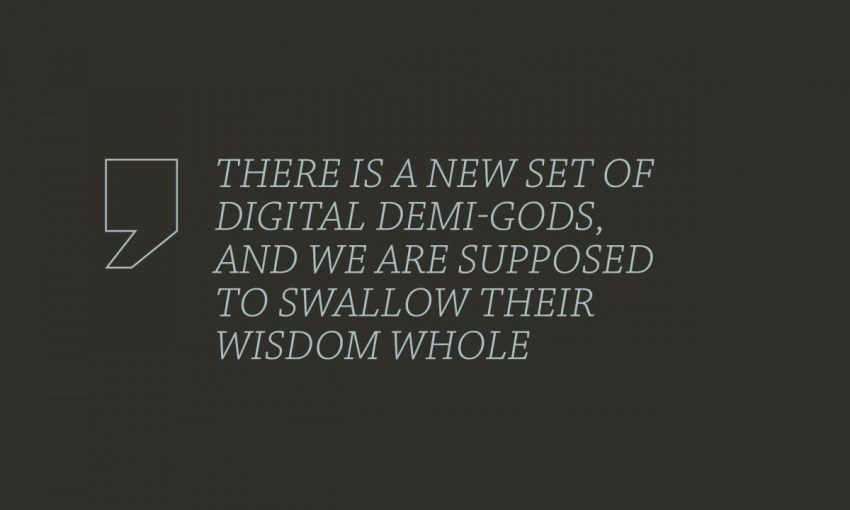Seeking wisdom in the age of internet snake oil salesmen.
We can’t all be heroes
Most mornings, when I wake up, there’s a song playing in my head.
A lot of the time it’s just a single riff, bar, verse or chorus. Recently, often, it’s Julian Casablanca’s voice repeating, “I’ve got nothing to say” over and over.

Farrin is founding editor of CityMag and City Standard.
Apart from locating me in a very specific age group and cultural genre, this recurring throwback to my long-since abandoned devotion to Indie music is also a very literal message from my subconscious to my waking self.
Sometimes, my brain really is just a barren plain filled with nothing.
As a magazine editor, and an author of opinion columns like this one, that’s obviously less than ideal. As a dinner party guest, it’s catastrophic. But as a human, I think it’s probably a good thing.
In addition to having nothing to say, I’m increasingly comfortable with not really even thinking anything (for a limited time only, of course, I’m not completely comatose). This, although I’ve never deliberately meditated, is what I think plenty of people are trying to achieve through the practice.
Yet, in the age of ‘the hustle’ and for what you might loosely call a (shudder) ‘entrepreneur’, a mind that voluntarily defaults to the real-world equivalent of Homer Simpson’s sleeping-donkey-with-flies brain feels like a bad thing.
I run a magazine and am in the process of developing a start-up of sorts, and – apparently – for people ‘like me’ there is a particular set of new demi-Gods, and I am supposed to swallow their wisdom whole.
These men (they are, almost invariably, male) preach a hyperactive lifestyle jam-packed with meetings, motivation, and market-able sound bites.
They are largely American (although there’s some Australians joining the fold). They have made a lot of money. And they repeat messages about working hard and never giving up and getting up at 5am and going to sleep at 1am and always doing something new and never staying still lest the competition catches you.
They certainly say some true, vaguely useful things on occasion.
But the worst among them (who also seem to be the most celebrated), people like the normally non-sensical Gary Vaynerchuk, say things completely disconnected from reality, such as “If anybody ever did it, then you can too”.
Nah. No matter how hard I work, I’m just not going to be on the same footing as Lachlan Murdoch and his inherited media empire. Regardless of how much I try to follow Gary’s tip to “just make one person happy – you”, I’ll never have the resources and consequential capacity to fail and rise again that someone like Gina Rinehart has.
Advice like this is dangerous, especially when vigorously and aggressively delivered using hyperbolic language designed to draw clicks and create loyalty among a digital following.
Targeted, as they are, at people who go looking for wisdom in times of stress (business or personal), these teachings can easily be seized upon as ‘the answer’ someone is desperately seeking. And in a world of work and life that is changing so rapidly that it’s barely recognisable one decade to the next, the more traditional sources of wisdom – like parents, friends, and mentors – are often dismissed.
But these internet influencers are not responsible or balanced. They are interested, mostly, in saying something controversial enough to grow their audience. So they advise their followers not to sleep, they tell them simultaneously to ‘take a mental break’ and that Saturdays are for working, they inform them that if they’re not successful it’s because they’re not working hard enough.
All these people think me having nothing to say is terrible. But I don’t think having hundreds of thousands of followers makes you wise, so I think I’m going to ask my Mum about it.




